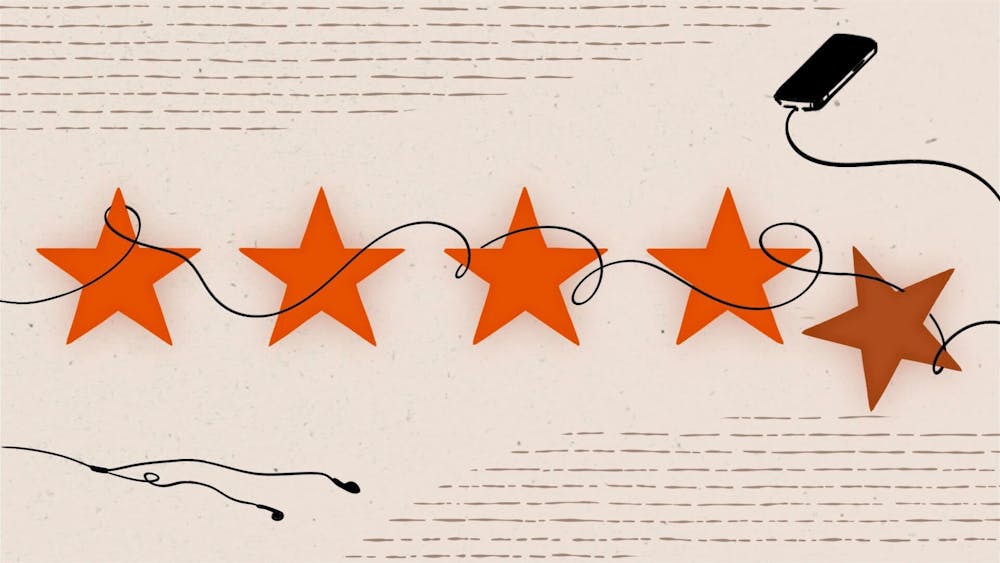My fellow foodies know that the perfect dinner is a several–act–long play. Act I consists of thorough research: extensive scrolling through Reddit's r/PhiladelphiaEats, then moving on to Beli, shortlisting numerous places, surveying pictures and reviews, and judging their social media as if their Instagram “coolness” is synonymous with their food’s delectability. Then comes Act II, the dining experience: Are the lights dim but not too dim? Is it loud enough to create a lively ambiance but not so loud that you have to scream across the table? The final act, Act III, is arguably the most exciting: the rating. In the Uber back, you present your critiques and deliberate; you present your scores. Another one ticked off the list!
We are obsessed with analyzing most aspects of our lives and branding them with a number. Beli stores every place we eat at, Letterboxd contains all of our attempts to become a film bro, and Goodreads is a record of our reading habits. Social media and technology have turned us all into critics.
When we’re solely concentrating on checking things off lists and actively critiquing them, however, it inevitably damages our experiences of them. It becomes a numbers game, and we rob ourselves of what could have been a meditative and delightful experience without the pressure to evaluate. In the race to finish one adventure and move on to the next, we don’t give ourselves time to linger in fresh insights and learn fully from our experiences. For example, when it’s one book after the other, we hinder ourselves from wholly engaging with the text and maximizing its impact on us. Books are not merely strings of words to stare at; they can only have their true effect when we ruminate on them, letting the meaning of their words linger.
Another pitfall of this review epidemic is how it encourages us to depend on others’ opinions. As a huge bookworm at 9–years–old, I spent many afternoons in bookstores, rummaging through endless shelves of Enid Blyton, Jacqueline Wilson, and Roald Dahl. It was a simple yet thrilling endeavor: I’d be enticed by flashy book covers, read their backs, make a pile with the intriguing ones, and buy the one that spoke the most to me. Today, however, I often find myself looking up books I come across, perusing their ratings online. Anything less than four stars goes back on the shelf; what’s the point of buying a book that other people didn’t like? In our productivity–addicted, chronically online world, it’s a miracle that we have enough time to pick up a book in the first place. Now, we must make it worthwhile. It’s probably a mixture of capitalism, online hustle culture, and Penn’s competitiveness that has pushed us to become ultra–efficient: We shouldn’t waste time reading an average book or eating at a subpar restaurant. The greatest utilization of our time should be to experience the best of the best.
However, there’s no one–size–fits–all for the best piece of literature. For instance, one person’s best book can be another person’s “did not finish.” As film critic Jonathan Rosenbaum states in his 2005 article, his ratings are solely a “summary” of his “personal response” and not “a declaration of some objective value and certainly not of any sort of consensus.” There is no guarantee that the countless “Top Ten” lists online, decided by a group of people with their individual interests and passions, will be worth spending our time on. So what’s the point of obsessing over them?
When we only expose ourselves to what others have deemed “amazing,” usually things that have gone viral online, we devoid ourselves of endless art and literature waiting to be discovered. Also, more often than not, social media publicizes the works of white, heterosexual men (and women, sometimes). If we only seek out these suggestions, we ignore a treasure trove of exquisite creations by people who don’t fit into the mainstream mold. We end up confining ourselves to the ideas that have been accepted by other members of society. There is nothing that motivates us to think differently and more deeply, no unexplored texts to dive deep into and get inspired.
An addiction to ratings forces us to become increasingly out of touch with our own thoughts and opinions. We are well aware of how we’re scrolling ourselves to “brain rot.” When we constantly look to others for recommendations, our sense of self slowly erodes. What happens when we can’t decide what book to get because we no longer know what we like? What if we could put our phones away and fall prey to the magic spell cast as we sift through shelves and discover a unique piece of literature?
In Against Interpretation, Susan Sontag argues against the interpretation of art: “To interpret is to impoverish, to deplete the world.” Art must be fully felt and experienced without any logical understanding to have its full impact. In the same vein, forms of art such as literature, films, and even food must be experienced first. Instead of strangling them for meaning and critically evaluating all their flaws, first and foremost, we must recognize how they make us feel: Did we enjoy it? What parts stuck most with us? After all, the whole point of trying new things is to let them change the way we see ourselves and the world—something inexpressible in our star–ratings or blurbs.

